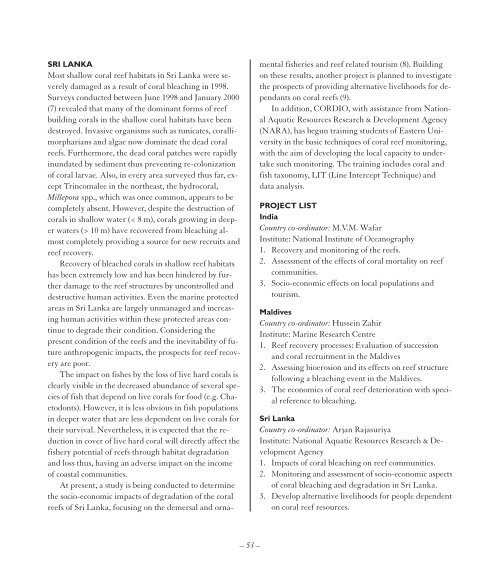You also want an ePaper? Increase the reach of your titles
YUMPU automatically turns print PDFs into web optimized ePapers that Google loves.
SRI LANKA<br />
Most shallow coral reef habitats in Sri Lanka were severely<br />
damaged as a result of coral bleaching in 1998.<br />
Surveys conducted between June 1998 and January <strong>2000</strong><br />
(7) revealed that many of the dominant forms of reef<br />
building corals in the shallow coral habitats have been<br />
destroyed. Invasive organisms such as tunicates, corallimorpharians<br />
and algae now dominate the dead coral<br />
reefs. Furthermore, the dead coral patches were rapidly<br />
inundated by sediment thus preventing re-colonization<br />
of coral larvae. Also, in every area surveyed thus far, except<br />
Trincomalee in the northeast, the hydrocoral,<br />
Millepora spp., which was once common, appears to be<br />
completely absent. However, despite the destruction of<br />
corals in shallow water (< 8 m), corals growing in deeper<br />
waters (> 10 m) have recovered from bleaching almost<br />
completely providing a source for new recruits and<br />
reef recovery.<br />
Recovery of bleached corals in shallow reef habitats<br />
has been extremely low and has been hindered by further<br />
damage to the reef structures by uncontrolled and<br />
destructive human activities. Even the marine protected<br />
areas in Sri Lanka are largely unmanaged and increasing<br />
human activities within these protected areas continue<br />
to degrade their condition. Considering the<br />
present condition of the reefs and the inevitability of future<br />
anthropogenic impacts, the prospects for reef recovery<br />
are poor.<br />
The impact on fishes by the loss of live hard corals is<br />
clearly visible in the decreased abundance of several species<br />
of fish that depend on live corals for food (e.g. Chaetodonts).<br />
However, it is less obvious in fish populations<br />
in deeper water that are less dependent on live corals for<br />
their survival. Nevertheless, it is expected that the reduction<br />
in cover of live hard coral will directly affect the<br />
fishery potential of reefs through habitat degradation<br />
and loss thus, having an adverse impact on the income<br />
of coastal communities.<br />
At present, a study is being conducted to determine<br />
the socio-economic impacts of degradation of the coral<br />
reefs of Sri Lanka, focusing on the demersal and ornamental<br />
fisheries and reef related tourism (8). Building<br />
on these results, another project is planned to investigate<br />
the prospects of providing alternative livelihoods for dependants<br />
on coral reefs (9).<br />
In addition, <strong>CORDIO</strong>, with assistance from National<br />
Aquatic Resources Research & Development Agency<br />
(NARA), has begun training students of Eastern University<br />
in the basic techniques of coral reef monitoring,<br />
with the aim of developing the local capacity to undertake<br />
such monitoring. The training includes coral and<br />
fish taxonomy, LIT (Line Intercept Technique) and<br />
data analysis.<br />
PROJECT LIST<br />
India<br />
Country co-ordinator: M.V.M. Wafar<br />
Institute: National Institute of Oceanography<br />
1. Recovery and monitoring of the reefs.<br />
2. Assessment of the effects of coral mortality on reef<br />
communities.<br />
3. Socio-economic effects on local populations and<br />
tourism.<br />
Maldives<br />
Country co-ordinator: Hussein Zahir<br />
Institute: Marine Research Centre<br />
1. Reef recovery processes: Evaluation of succession<br />
and coral recruitment in the Maldives<br />
2. Assessing bioerosion and its effects on reef structure<br />
following a bleaching event in the Maldives.<br />
3. The economics of coral reef deterioration with special<br />
reference to bleaching.<br />
Sri Lanka<br />
Country co-ordinator: Arjan Rajasuriya<br />
Institute: National Aquatic Resources Research & Development<br />
Agency<br />
1. Impacts of coral bleaching on reef communities.<br />
2. Monitoring and assessment of socio-economic aspects<br />
of coral bleaching and degradation in Sri Lanka.<br />
3. Develop alternative livelihoods for people dependent<br />
on coral reef resources.<br />
– 53 –


















